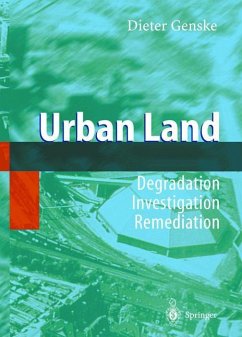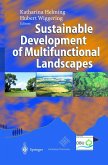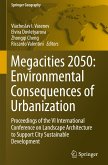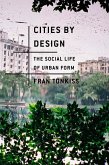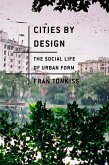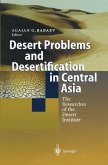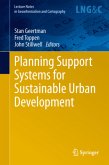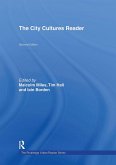Urban land is developed, utilised, abandoned and left to degradation in many different ways. These processes are closely related to four aspects of human activities: the extraction of resources, their transformation into goods, the production of waste and the conflicts that arise when population grows and demands increase while resources remain limited. Urban land is developed and deteriorates in the course of these activities, while cities keep spreading, consuming the green spaces surrounding them. Sustainable city development aims at protecting the environment by reusing urban terrain. The author brings together the different aspects of this transdisciplinary endeavour by discussing the causes of degradation, the strategies of investigation and the techniques of remediation of urban land.
Urban land is an environmental key topic considering the increasing urbani sation of our world. The amounting pressure on resources especially in the urban environment demand awareness across technical and political sectors and solid concepts for workable solutions. This book will address those people, who are key in coping with the challenges of sustainable urban land use management: Professionals in the growing field of urban land recycling and graduate students from different disciplines including urban planning, environmental sciences and geotechnics. Processes that lead to urban land degradation include the extraction of resources, their transformation into goods, the production of waste and conflicts in the allocation of land. Industrial soil pollution, soil sealing and urban sprawl pose serious challenges to resource management in urban environments. The possible implications are not necessarily restricted to the urban area but do have feedback into the countryside. The reduction of arable land in urban peripheries often causes enhanced pressure on back-country natural ecosystems such as forests, grass- and wetlands. Urban land recycling especially in the developing world is to be seen in the context of poverty alleviation and sustainable development. Ifwe don't get a proper sustainable use of urban land, as well as of water and other natural resources that relate to them, sustainable development will not be reached.
Hinweis: Dieser Artikel kann nur an eine deutsche Lieferadresse ausgeliefert werden.
Urban land is an environmental key topic considering the increasing urbani sation of our world. The amounting pressure on resources especially in the urban environment demand awareness across technical and political sectors and solid concepts for workable solutions. This book will address those people, who are key in coping with the challenges of sustainable urban land use management: Professionals in the growing field of urban land recycling and graduate students from different disciplines including urban planning, environmental sciences and geotechnics. Processes that lead to urban land degradation include the extraction of resources, their transformation into goods, the production of waste and conflicts in the allocation of land. Industrial soil pollution, soil sealing and urban sprawl pose serious challenges to resource management in urban environments. The possible implications are not necessarily restricted to the urban area but do have feedback into the countryside. The reduction of arable land in urban peripheries often causes enhanced pressure on back-country natural ecosystems such as forests, grass- and wetlands. Urban land recycling especially in the developing world is to be seen in the context of poverty alleviation and sustainable development. Ifwe don't get a proper sustainable use of urban land, as well as of water and other natural resources that relate to them, sustainable development will not be reached.
Hinweis: Dieser Artikel kann nur an eine deutsche Lieferadresse ausgeliefert werden.
Readers who are involved in urban land renewal and redevelopment should buy this book, read this book, and keep it within arm's reach of the workplace. Professor Allen W. Hatheway, Consultant in Forensics & Trouble-Shooting, Rolla, Missouri, USA "This textbook prevails the important message that remediation is feasible. It introduces possible solutions to pressing problems in the management of urban land resources. Urban land use policy is in strong need of such options in order to fulfil their mandate of providing sustainable urban environments." Dr. Klaus Töpfer, Executive Director United Nations Environment Programme, Nairobi, Kenya.
From the reviews: "... this is the book that we have been waiting for ... this book should grace the shelves of every public and private bureau associated with urban land use issues across Europe." Prof. Alan Simson, The Leeds School of Art, Architecture and Design (Urban Forestry and Urban Greening 2, 2004: 173) "In scope and content, it goes far beyond many works on this subject ... Overall it is a wide-ranging text incorporating a wealth of knowledge. Those involved with the management of contaminated land may read this text to widen their perspectives." Prof. Stephan Jefferis, Civil Engineering Department, University of Surrey (Geotechnique2005: 341) "Dieter Genske hopes that his textbook will stimulate discussion about sustainable use of urban land. ... The volume is well presented and printed. Figures are well selected from a wide range of sources ... . Overall, the book covers the wide range of material relevant to urban land in a limited space well and is worthy of examination. It is perhaps, best pitched at late-in-the course undergraduate, or graduate environmental scientists wishing to begin exploring urban land problems." (B.R.Marker, Land Degradation and Rehabilitation, Vol. 15 (6), 2004) "There is an increasing interest in the reclamation and re-cycling of previously disturbed land. ... this book is a valiant attempt to comprehensively address the issues involved. ... The book benefits from some 398 figures in the text and 28 tables. It is comprehensively referenced ... . this is a work of deep scholarship. ... There is both a depth and breadth of knowledge ... . this book should grace the shelves of every public and private bureau associated with urban land use across Europe." (Alan Simson, Urban Forestry and Urban Greening, Issue 2-3, 2004)

